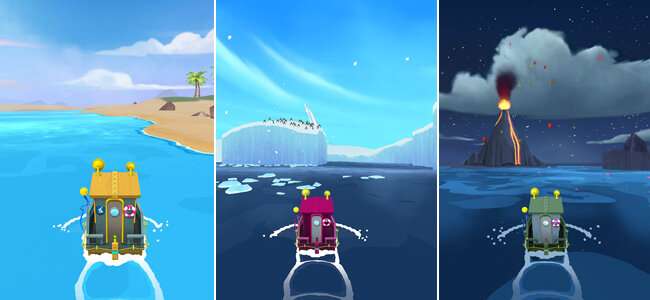World's largest study of spatial navigation offers free study platform to researchers

After a successful journey gathering data from 4.3 million participating players, the groundbreaking citizen science app Sea Hero Quest is now available for studies of cognition and spatial navigation.
Sea Hero Quest started out in 2016 as a consumer mobile game to help scientists understand navigational abilities across the life course. By building a picture of how navigation ability changes in the general population, players could contribute to research identifying changes characteristic of early Alzheimer's disease.
Originally led by Deutsche Telekom alongside Alzheimer's Research UK and leaders in gaming, technology, academia and research, the award-winning app quickly became a citizen science phenomenon.
Tim Parry, director at Alzheimer's Research UK, helped to bring the app to the public. He says that they "were really humbled by the response. It was more popular than we could ever have expected, and we ultimately collected data from over 117 years of combined game play. People from all over the world downloaded Sea Hero Quest and provided anonymised demographic information so that we now have an incredible wealth of data relating to navigation ability as we age."
Although the consumer version was removed from app stores when the original project concluded, Alzheimer's Research UK has once again partnered with game developers GLITCHERS, University College London, the University of East Anglia, and web developers BoldLight to create a bespoke version for researchers.
Parry continues that "while clearly we embarked on the project with dementia studies in mind, we want to mobilize this resource towards the greatest possible benefit for global research. The app is free for researchers in any field, and we have developed a highly-usable study administration dashboard, with guidance and support for those looking to use it in their studies."
This new phase of the project aims to provide researchers with a controllable, sensitive, safe, and easy way to administer digital cognitive assessment of navigation ability. The system allows researchers to create and fully manage prospective studies, invite targeted groups of participants to play through an easily download from the Android or Apple app stores, and provides access to study participants' data in real time.
Prof Hugo Spires from University College London collaborated in the development and validation of the Sea Hero Quest app. Prof Spires' team has led the analysis of the anonymous player data. He said that "our validation testing showed that performance in the game is strongly correlated with performance in real-world tasks. While data gathered from citizen science projects is inherently noisy compared to lab research, the unprecedented scale of the project so far means that our benchmarking data far exceeds the accuracy of previous research in this area.
"The citizen science element of this project has already revealed new insights into human spatial navigation at a planet-wide scale. We've found that these abilities are clustered according to economic wealth and gender inequalities globally, and this may have significant implications for cognitive testing in cross-cultural studies and multi-center clinical trials."
Prof Michael Hornberger from the University of East Anglia had the original idea for the project. Prof Hornberger has been leading on applying the platform to dementia research. He says that "while obvious difficulties navigating commonly occur alongside cognitive problems in the early stages of Alzheimer's disease, emerging evidence suggested that subtle navigation changes can precede memory deficits by many years. Detecting these changes could potentially allow for earlier diagnosis and, ultimately, earlier intervention. The challenge we have is reliably distinguishing the navigation changes we see in healthy aging from the early signs of Alzheimer's."
"The data from the mass-market phase of Sea Hero Quest is now helping to overcome this. My team has used the platform to show that we can detect people who are at genetic risk of Alzheimer's based on how they play the game. These are people without deficits in standard neuropsychological testing."
"We are still in the early stages of our work with Sea Hero Quest and what it can help us to learn about the early stages of dementia. I hope that other areas of medical and psychological research take advantage of the opportunities afforded by the new phase of the project so that we maximize the potential of this powerful platform for research."
More information: Sea Hero Quest information: www.alzheimersresearchuk.org/r … tion/sea-hero-quest/




















